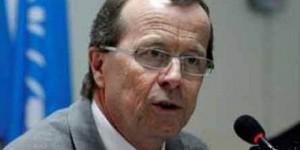By Sami Zaptia.

Tunis, 31 March 2016:
Martin Kobler congratulated Prime Minister designate Faiez Serraj, criticized the House of Representatives for their weak . . .[restrict]leadership and stressed that IS/Daesh could only be fought militarily.
Kobler was speaking today at the UN organized Third Libya Experts Development Cooperation Forum held in Tunis 31 March to 1 April.
In his keynote speech the Special Representative of the Secretary General strongly welcomed the arrival in Tripoli of the Presidency Council headed by Prime Minister designate Faiez Serraj which he described as a ‘’courageous act’’.
Kobler confirmed that he had just returned from Istanbul where he had met with members of political parties including Belhaj where he said he urged them to use their influence to call for the peaceful transition to the GNA.
He revealed that he had been speaking until midnight with the various political entities in an attempt to get the House of Representatives to hold a vote and approve the Government of National Accord (GNA) and its proposed government.
The UNSMIL head revealed that there was pressure on him to allow changes to the Libyan Political Agreement (LPA), which had been approved in principle by the HoR. But Kobler insisted that the LPA would not be reopened for negotiation. ‘’There is no plan b’’, he insisted.
The only immediate plan he insisted is the peaceful and orderly process of handover of power. He also insisted that the legitimacy of the LPA was important adding that nobody could contest its legitimacy.
He lamented the situation in Libya saying that its ‘’a shame what is happening in Libya’’.
He criticized the HoR when comparing them with Serraj’s courageous entry into Libya, saying that the ‘’we don’t have equal determination in the HoR’’. Adding that the ‘’politicians’’ were ‘’not playing their role’’. He complained that in the HoR ‘’the minority spoilt’’ the vote and that it was not a ‘’good performance by the HoR.
But he that Libya ‘’cannot wait for the HoR if they intentionally block’’ the vote. He stressed that he was against moving the vote to another city in order to be able to vote on the GNA and its government.
He stressed that there was ‘’no alternative’’ to the ‘’decision to go to Tripoli’’ and that it was crucial to observe what happens in Tripoli in the next 24 hours.
He accepted that there is ‘’considerable opposition’’ to the Presidency Council and its GNA entering Tripoli, giving the Mufti’s statement as an example as well as those with weapons and ideological groups. However, he noted that the opposition was not from the people.
With regards to the role of the Libyan experts gathered before him, discussing the major tasks ahead of the Libyan GNA which has just arrived in Tripoli yesterday, Kobler said ‘’we need action plans’’. ‘’Now, expertise is needed and the real work starts’’. People expect quick results. ‘’We have seen long queues outside the banks and the government now has to act’’, he stressed.
The Libyan experts need to come up with a work programme and see how they can assist the government.
On the fight against IS/Daesh in Libya, Kobler said that this fight needed ‘’a unified security structure’’ to be in place in Libya. IS could not be fought with the disparate Libyan parties currently disunited and fighting IS in an uncoordinated manner.
He said that the fight against IS ‘’needed modern weapons’’ and these could only be obtained by Libya if there is a GNA which would allow for the arms embargo imposed on Libya to be lifted.
There will be no economic development and progress in Libya if there is no security and if IS is not fought, Kobler explained.
Answering questions from the Libyan experts before him, Kobler admitted to one critical comment that the international community had made mistakes after the 2011 Libyan revolution. He admitted that it was ‘’a mistake to leave Libya alone after 2011. We are trying to repair mistakes of the past’’, he admitted.
Kobler was hawkish in his view of how IS was to be dealt with. ‘’There can only be a military solution against Daesh and Ansar’’, he said. They flourish in situations of military and security vacuums, he explained and confirmed that in Libya they were ‘’mostly foreign’’ and that this was a type of ‘’occupation’’.
However, Kobler stressed that there was ‘’remarkable coherence by the international community on Libya compared to say Syria’’. Kobler said that there were ‘’four governments’’ in Libya: in Beida, Tripoli, the GNA and ‘’Daesh in Sirte’’. The one in Sirte should ‘’disappear’’ and only the GNA should remain. The governments in Beida and Tripoli were ‘’failing to deliver’’, he stressed. [/restrict]








